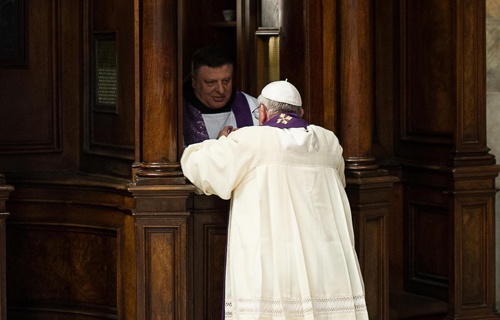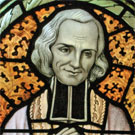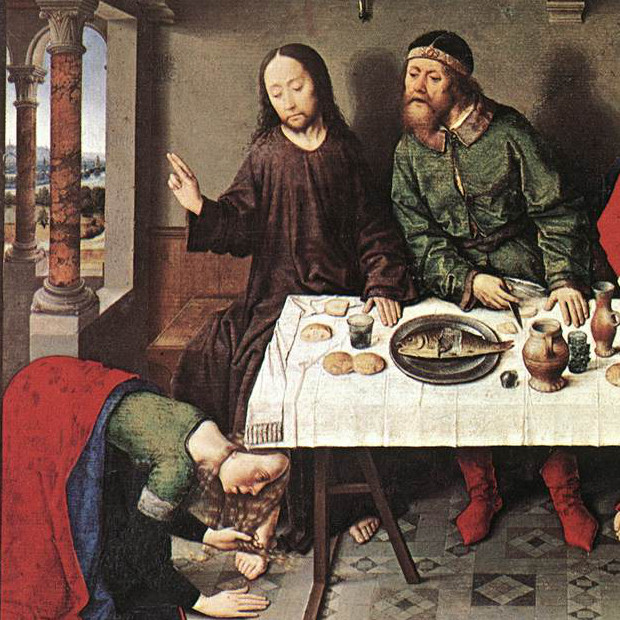Two weeks ago, Pope Francis inaugurated a “Festival of Forgiveness,” which he hopes becomes an annual Lenten fixture all over the world.
The initiative includes a 24 hour vigil, wherein churches remain open, and confession is continuously available, for a 24 hour period. The Pope celebrated a Second Rite of Penance and Reconciliation in St Peter’s Basilica, and heard confessions himself for an hour. There is nothing radical in this. Pope John Paul II and Pope Benedict both heard the confessions of lay faithful in Lent and at World Youth Days.
However, the following footage shows something unprecedented:
To my knowledge, no pope has ever gone to confession in public. But it’s no great surprise that Francis should be the first to do this. Not only because he is a master of startling but simple gestures, but because he is devoted to sacramental confession, and so eager to promote it. He has spoken more about this sacrament than any other. (Just last month, a journalist asked him for a self-assessment of his papacy. Francis declined: “I do that every fifteen days — but only with my confessor.”)
Last Sunday’s Gospel — the raising of Lazarus — is laden with symbols relating to this sacrament. The Church Fathers excelled at reading spiritual meaning into the Scriptures, without in any way rejecting the literal historical meaning. St Augustine suggests the death of Lazarus symbolises our own death. Not in the sense of illness and physical death, but in the sense of sin and spiritual death. This sort of death is very subtle, because it is disguised as life: having eyes but not seeing; having ears but not hearing; having a heart but not loving. Spiritual death is also very gradual: a slow enslavement to bad habits; a slow deadening of the conscience; a slow distancing from others.
Augustine sees in the stone sealing Lazarus’ tomb the addictions and desires which enslave us, denying us freedom. The tomb itself is the darkness which blinds us to God’s presence in our lives, in strangers and friends, and in ourselves. And perhaps most compellingly, he likens the bandages binding Lazarus to the shame and discouragement and fear which hampers our conversion. This is what us stops us from praying after we fall into sin. It stops us from “starting again” with simplicity and optimism. And it stops us from going to confession.
I think it’s very telling that the Sunday Gospel before this one had our Lord healing a blind man by spitting into the dust and creating an ointment. Jesus could have healed the man by a simple act of the will, but instead he made use of physical symbols, in a way very evocative of the sacraments he has bequeathed us.
In the case of Lazarus, our Lord again does something which isn’t necessary, except for the edification of onlookers. This time, he looks up to Heaven and prays aloud. Then he shouts at Lazarus to come out. He needn’t have done this. Again, he could have performed the miracle by an invisible and instantaneous act of the will. But instead he employs speech, and explains his actions:
I knew that you always hear me, but I have said this for the sake of the crowd standing here, so that they may believe that you sent me.
Jn 11:42
Words matter. Confessing our sins — naming them aloud — matters. Similarly the words of absolution, spoken by the priest but really pronounced by our Lord himself, matter.
The Sacrament of Penance and Reconciliation, St Augustine counsels, rolls away the stone, banishes the darkness, and unbinds us. “When we live with sin, we lie in the arms of death . . . But when we confess, we come forth.”





A brilliant analogy…thank you Fr John 🙂
Truly inspirational, Father John. Beautifully written. Yes…Amen!!!